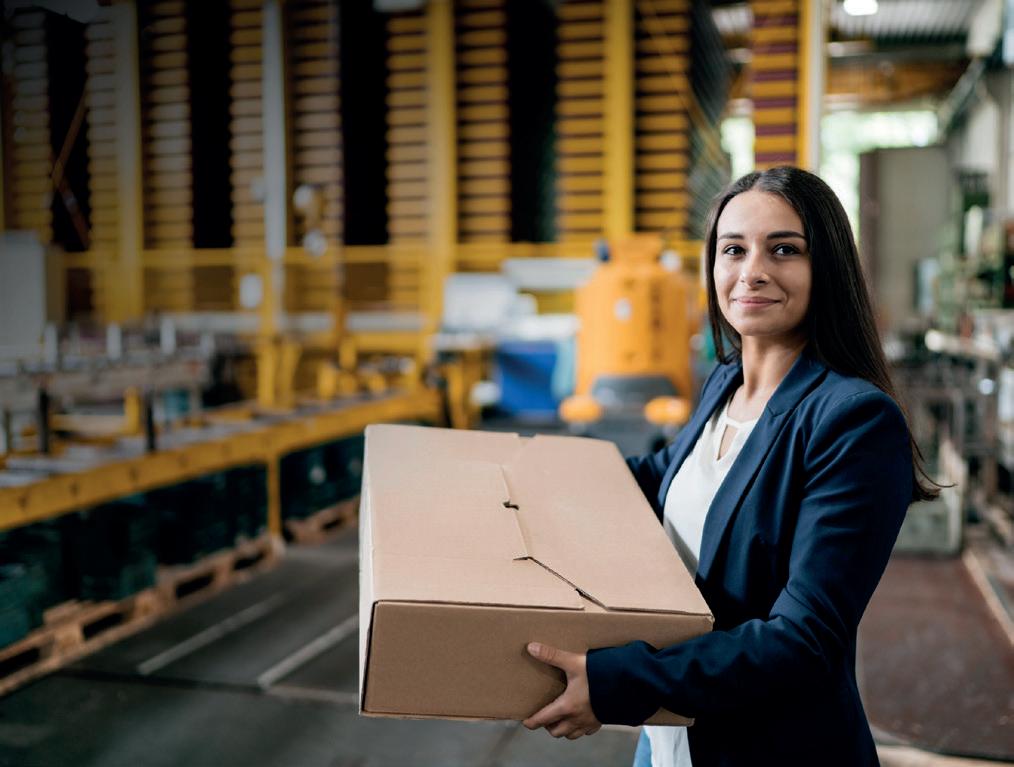
9 minute read
toxic-free environment
Rising to the challenge of creating a future-proofed sustainable, toxic-free chemicals industry
The question as to if we should imagine such a future has (hopefully) been answered with a resounding “we have no choice”, leaving us with the question “how”? The EU has outlined its answer in its newly published Chemicals Strategy for Sustainability Towards a Toxic-Free Environment which links into its Green Deal, Horizon Europe and the public-private partnership Circular Bio-based Europe. And the UK should be able to play a vital role. But what exactly are these initiatives?
Advertisement
By Dr Sarah Hickingbottom
Bio-based Chemicals Business Consultant and Advocate
Chemicals are indispensable to our daily lives, but contribute significantly to toxins, pollution, waste and emissions. Yet today, after decades of outstanding R&D and millions in investment, science has delivered previously unimaginable solutions to our climate, biodiversity and resource challenges. Industrial biotechnology and bio-based innovation means (for example) household waste can become organic base chemicals, industrial waste gases act as fertilizer feedstocks and waste cellulosic biomass is converted into novel, toxicfree industrial solvents. Plus, digitalisation, AI and IOT are revolutionising manufacturing alongside 3D printing, electrification and renewables – i.e. the technical barriers to achieving a sustainable, toxicfree chemicals industry using feedstocks that are renewable, bio-based and/or waste-derived where viable are being stripped away. But if such innovations are never nurtured beyond pilot scale then we cannot truly call them ‘solutions’, but rather they are merely interesting ideas published in dusty journals. We cannot afford the gathering of any more dust, no matter how difficult scaling-up might be. Indeed, in some regards, we can argue the R&D was the ‘easy’ part when compared to bringing industrial players on-board; generating the political will; securing the finance; re-formulating regulations/ polices; accepting risk; changing end-user practices; handling legacy assets; shaping consumer perceptions; and, finally, building and operating commercial plants. Nonetheless, industry, governments, end-users, innovators and citizens globally are stepping-up to ensure this is the decade we’ll realise industrial-scale change in the chemicals we manufacture, use and then dispose of. It’s a multi-layered, complex topic with a number of initiatives and from a sustainable, circular bioeconomy perspective, it’s useful to set the scene as to what exactly is (a) a bio-based chemical? Or biotechnology? Or (b) circular chemicals industry? Or (c) the initiative being called ‘Circular Bio-based Europe’ (CBE)? The simple answers being (a) bio-based chemicals are derived from non-petro feedstocks, such as crops, woody biomass and, preferentially, their waste-streams along the value-chain. In contrast, biotechnology is the use of biological processes with raw materials that may be bio- or petro-based. The bioeconomy encompasses both industrial biotechnology (IB) and bio-based chemicals and materials. (b) A circular chemicals industry is one where waste is exploited as feedstock – upcycling old molecules into new while eliminating pollutions and minimising resource consumption.
To turn to question (c) – what is the EU initiative Circular Bio-based Europe? CBE is the successor to the Bio-Based Industries (BBI) and both are the European Union’s public-private partnership (PPP) initiatives with private industry. The private arm of these two PPPs is represented by the Biobased Industries Consortium (BIC). BIC members come from chemicals industry, SMEs and cluster organisations as well as universities as associate members. The €3.7 billion BBI was part of Horizon 2020 whose goal is to accelerate, as a financial instrument with minimal red tape, globally competitive science and industrial leadership to tackle societal challenges. Underpinned by chemicals and materials, between 2014-2020 the BBI funded in excess of 120 projects. These include over a dozen flagship, first-of-their-kind-in-Europe biorefineries at commercial scale and each with high replicability potential. As of January 2021, Horizon 2020 has been replaced by Horizon Europe and will run to December 31st 2027 with the public-private partnership CBE leading on the circular bioeconomy. The goals are being stretched further to drive innovation and its application in the wider economy. Notably, the UK is now confirmed in principle as an Associate of Horizon Europe, including CBE (whilst, at the time this article goes to press, we are awaiting parliamentary scrutiny there is not expected to be hiccups). Though, UK innovators will not have access to financial instruments through the European Innovation Council. The 2019 Green Deal is the EU’s strategy to transition to a clean, circular economy that restores biodiversity and cuts pollution. Its emphasis is on upstream agricultural, forestry and biodiversity as well as transport and related chemicals. This brings us to the EU’s new Chemicals Strategy for Sustainability Towards a Toxic-Free Environment (October 2020) which is a key component of the Green Deal and is its boldest for 20 years. However, there is scope for the EU to go further to accelerate industrial chemicals change and a number of organisations are asking for exactly this – for the development of a Green Deal targeted towards chemicals, its value-chains and the circular bioeconomy’s role in delivering a sustainable, toxicfree industry for the future. Although we may need the EU to be even bolder with their ambition for chemicals, this strategy is welcome and much needed. The UK’s long-awaited, new chemicals strategy is on hold – when it restarts, and as we now sit outside of the EU, perhaps it may go even further than the EU’s ambitions? As we shape the frameworks that will shape our futures, we need in place not only innovationdriven financial instruments, such as CBE, but also the actual enforcement of the principle ‘the polluter pays’. Horizon Europe and CBE can be seen as ‘carrots’ while banning toxins, introducing carbon taxes or the removal of petro-subsidies would be ‘sticks’. Regulations and policy play fundamental roles to both remove barriers and pave the path forwards. Acceleration of commercialisation is key. For example, Europe could embrace a USstyle preferred public procurement policy for sustainable, circular and bioeconomy products to pull demand and give guarantees that if we manufacture, the markets will purchase. And companies across industries and geographies need to re-imagine their accounting practices – their profit and loss balance sheets – to account for natural resources and impact on climate. This is the goal of Green Finance which is reimaging accounting, financing and investment to influence, as shareholders, company aspirations and strategy via ESG (Environmental, Social and Governance) mechanisms and beyond. In recent weeks the much-anticipated Dasgupta Review on the Economics of Biodiversity, commissioned by the UK Government, has been published and which outlines the argument for a shift in economics to account for natural resources and climate.
Finally, returning to the essential world of chemicals, there is another piece of the jigsaw which must not be forgotten, that of the need to secure the circular, sustainable bio-based feedstocks of the future. It is all too easy to see these feedstocks as sources of power, fuel or heat. But as renewables mature and electrification replaces the combustion engine, we must ringfence valuable biomass for the manufacture of the chemicals and materials which cannot be stripped out of circular value-chains. We’re in a crossover time-period where transport and power are easier (and encouraged) waste-stream end-uses. With the support of policy makers, the chemicals industry needs to stake a claim today otherwise feedstock supply and economics may slow down commercialisation needlessly. You can contact Dr Hickingbottom at:
linkedin.com/in/sarah-k-hickingbottom

MANUFACTURERS ENCOURAGED TO ACT NOW WITH NEW ON-DEMAND VIDEOS ON EU TRADE RULES
New on-demand videos are available for manufacturers in a drive to encourage them to act now and follow the new rules agreed as part of the UK’s free trade agreement with the EU.
The videos, being rolled out by the Department for Business, Energy and Industrial Strategy (BEIS), are designed to help businesses take advantage of the deal, which maintains zero tariffs and zero quotas on trade in goods between the UK and EU. Business sectors, including manufacturers will find videos on 14 priority topics including:
Importing and Exporting
Placing and selling goods on the market
Trade agreements
Operating Online
Data
Tariffs
Those manufacturers yet to take action are being urged not to delay any longer. County Durham-based, Thomas Swan and Co Ltd started preparing early and is encouraging businesses to take action. The business is a performance and speciality chemical manufacturer, making products for many household disinfectants or rubber processing additives that go into tyres. Owner and CEO, Harry Swan said: “Businesses can’t assume everything will be done for them and must act now to ensure they have the correct licenses to operate. About 30% of our goods are sold into the EU. We started planning early and were granted Authorised Economic Operator (AEO) status by HMRC which helped us to export from 1 January 2021 by smoothing customs procedures and avoiding any surprises. “We also set up a dedicated internal resource to focus on regulations, check what actions we needed to take under UK REACH and EU REACH to continue to manufacture and place chemicals on the GB, NI and EU markets. We have also ensured that our employees have the correct visa requirements. “I would recommend other manufacturers use gov.uk and the new on-demand videos which have clear guidance to support business and help them begin to take advantage of the new trading arrangements.” The company employs 176 people and has sales offices in Shanghai, China and Newark, USA. Earlier this week, Business Minister Paul Scully set out a checklist of key actions all business may need to take relating to exporting goods, professional qualifications, hiring staff, business travel, intellectual property, and accounting and reporting. Business that registered for previous webinars will receive an email encouraging them to visit the new updated website.
The best place for businesses to get support is
gov.uk/transition
Speak with your lawyer and accountant for more information, or answer questions using the checker tool to generate information tailored to your business, and to sign up for email updates.
Harry Swan, Owner and CEO
TOP THINGS TO DO NOW

The UK has agreed a deal with the EU. Rules for doing business with Europe have changed, and we all need to make changes to keep business moving. While the deal with the EU means zero tariffs and zero quotas, businesses still need to adapt to changes to trade and customs procedures, and changes to travel.
Businesses should use the Brexit checker tool at gov.uk/transition for a personalised list of actions.
TAKE ACTION NOW TO KEEP YOUR BUSINESS MOVING
GOV.UK/TRANSITION
PUMPS & PUMPING SOLUTIONS
ROTAN® CD

Flexible sealing options “True” back pull-out design Opposing inlet and outlet connections with oversized ports Shaft supported by two ball bearings in single sealed configuration Self-priming with large suction capabilities Designed to handle corrosive liquids. Self-draining, integral safety relief valve No speed reduction required in six smaller sizes Complete heating/cooling jacketing available

ROTAN® ED

Magnetically coupled for ultimate protection against leakage Reversible direction of flow with double acting relief valve option available Adjustable rotor end clearance Torque capabilities in excessive of 800 ft-lb Flow rates max. 90 m3/h with differential pressure up to max. 16 bar Iron, Steel and Stainless Steel construction Tungsten Carbide abrasive wear materials are available for abrasive duty applications








